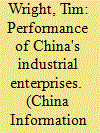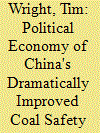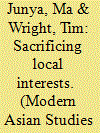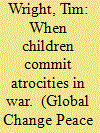|
|
|
Sort Order |
|
|
|
Items / Page
|
|
|
|
|
|
|
| Srl | Item |
| 1 |
ID:
104795


|
|
|
|
|
| Publication |
2010.
|
| Summary/Abstract |
Our parents' generation grew up at a time of intense global instability, with two superpowers
madly competing to build the biggest, most ferocious nuclear arsenal, capable of destruction
on a scale beyond anybody's imagination. For progressive-minded people everywhere,
nuclear disarmament was the cause of the moment-one in which everybody, young and old,
had an equal stake. Thousands demonstrated in the streets to demand an end to the lunacy of
government policies and programmes that threatened to annihilate entire nations. In literature,
cinema, music and art, nuclear weapons featured prominently. Like climate change today, the
bomb was centre stage.
|
|
|
|
|
|
|
|
|
|
|
|
|
|
|
|
| 2 |
ID:
098860


|
|
|
|
|
| Publication |
2010.
|
| Summary/Abstract |
This paper analyses the trajectories of handicraft cloth production in three major sub-regions of Jiangsu Province in the late nineteenth and early twentieth centuries. In contrast to traditional focus on the bankruptcy of rural handicrafts in the face of competition from the modern industry, it argues that the fate of handicrafts depended on the specific characteristics of each sub-regional economy. Thus in Song-Tai, handicraft weaving declined as labour was drawn off into modern industry. In Tong-Hai the availability of machine-spun yarn in the market enabled the development of a commercialised handicraft weaving sector. Finally, in Xu-Huai-Hai machine-spun yarn enabled the inhabitants to substitute their own subsistence handicraft production for cloth purchased from elsewhere.
|
|
|
|
|
|
|
|
|
|
|
|
|
|
|
|
| 3 |
ID:
072865


|
|
|
|
|
| Publication |
2006.
|
| Summary/Abstract |
Coal mining has been one of the biggest loss-making sectors among China's state-owned enterprises (SOEs), and the performance of the industry might thus throw light on broader questions of enterprise performance during China's reform period. After outlining the overall financial performance of coal mining SOEs, the article examines the medium- and long-term influences on the performance of coal mining enterprises in four major categories--those relating to government policies, to the market, to the particular nature of coal mining as an extractive industry, and to internal enterprise operation. The article concludes that, up to the mid-1990s, the state's economic priorities expressed through the fixing of prices were the most important negative influence on coal mining profits. After the incomplete deregulation of prices by 1994, while the government's role remained important, price competition in the context of more conventional economic cycles became the key influence. This article hopes to add an important industry perspective to a debate that has in the past focused either on the SOE sector as a whole or on individual enterprises or groups of enterprises.
|
|
|
|
|
|
|
|
|
|
|
|
|
|
|
|
| 4 |
ID:
184720


|
|
|
|
|
| Summary/Abstract |
China's coal safety has improved dramatically since 2003. This article will present the official data and conclude that it is almost impossible that the figures conceal a situation where there has not been remarkable improvement. Structural factors including China's level of economic development, changes in the labour market and the economic health of the industry have played an important role, but state commitment and policies have been central at least to the speed and magnitude of the improvement.
|
|
|
|
|
|
|
|
|
|
|
|
|
|
|
|
| 5 |
ID:
121985


|
|
|
|
|
| Publication |
2013.
|
| Summary/Abstract |
From the end of the fifteenth century, the Ming state redirected the entire flow of the Yellow River into the course of the Huai River in order the facilitate the transport of tribute grain. This shifted the major problems of water control from the middle and lower reaches of the Yellow River to the Huaibei region. Huaibei was viewed as 'a local interest', as opposed to the 'general interests' represented by the central government, and was sacrificed for those general interests. These policies, which were continued under the Qing dynasty, created widespread and frequent flooding in the region, causing short-term famine and destruction and leading to long-term economic decline.
|
|
|
|
|
|
|
|
|
|
|
|
|
|
|
|
| 6 |
ID:
076959


|
|
|
|
|
| Publication |
2007.
|
| Summary/Abstract |
This paper analyses the capacity of China's central state to control society and implement its policies at the local level, using as a case study the implementation from 1998 of a major policy initiative - 'closing the pits and reducing coal production'. The aims of this policy were to close down many of the TVE (township and village enterprise) mines, thereby ameliorating China's coal safety record, and to reduce output in order to balance supply and demand, thereby improving the situation of the SOE (state-owned enterprise) coal mines. The paper concludes that, despite some success, the state found it difficult to overcome resistance from a powerful coalition of local cadres, mine bosses, workers and farmers who depended directly or indirectly on the mines for their living. It therefore highlights continuing shortfalls in China's state capacity, particularly in situations where the state is trying to control or influence the distribution of economic rents as between different groups in society.
|
|
|
|
|
|
|
|
|
|
|
|
|
|
|
|
| 7 |
ID:
099002


|
|
|
|
|
| Publication |
2010.
|
| Summary/Abstract |
There is considerable disagreement among governments, civil society groups and scholars as to whether the prosecution of child soldiers who have committed war crimes is ever appropriate. In one camp are those who argue that child soldiers should always be considered as victims, and that prosecutions are necessarily at odds with rehabilitation and reintegration efforts. On the other side of the debate are those who maintain that the prosecution of the worst child offenders - those who have occupied command positions in armed forces, and carried out particularly egregious crimes - can help to end impunity for war criminals and bring a degree of solace to the victims of their brutal assaults. This article considers the different approaches to criminal responsibility for minors in domestic legal systems and under international law, and concludes that the prosecution of child soldiers should only be pursued in exceptional circumstances.
|
|
|
|
|
|
|
|
|
|
|
|
|
|
|
|
|
|
|
|
|